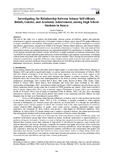| dc.contributor.author | Aurah, Catherine | |
| dc.date.accessioned | 2019-03-18T07:56:07Z | |
| dc.date.available | 2019-03-18T07:56:07Z | |
| dc.date.issued | 2017 | |
| dc.identifier.issn | ISSN 2222-1735 (Paper) | |
| dc.identifier.uri | http://r-library.mmust.ac.ke/123456789/1270 | |
| dc.description.abstract | The aim of this study was to explore the relationships between science self-efficacy, gender, and academic
achievement in genetics among form four (12th grade) students in Kenya and to investiPSTe gender differences
in science self-efficacy and academic achievement in genetics. A total of 2,139 students responded to a science
self-efficacy questionnaire, adopted from SEMLI-S by Gregory Thomas, David Anderson, and Samson Nashon
(2007). A (PST) was then administered to test the academic achievement of students. Data were analysed both
descriptively (means and standard deviations) and inferentially (MANOVA and Pearson's Correlations). Results
of the analyses revealed that students' science self-efficacy is highly correlated to academic achievement. Oneway
MANOVA results indicated gender differences in both self efficacy and academic achievement, with female
students performing better than male students in both outcome variables. These findings are inconsistent with the
extensive research done on gender differences where females always perform poorer than males in sciencerelated
courses and tasks and hence have pertinent implications for both biology teachers and science educators. | en_US |
| dc.description.sponsorship | www.iiste.org | en_US |
| dc.language.iso | en | en_US |
| dc.publisher | (MMUST), | en_US |
| dc.relation.ispartofseries | Vol.8, No.8, 2017; | |
| dc.subject | Self-efficacy, Academic Achievement, Gender, Genetics | en_US |
| dc.title | Investigating the Relationship between Science Self-efficacy Beliefs, Gender, and Academic Achievement, among High School Students in Kenya | en_US |
| dc.type | Other | en_US |

